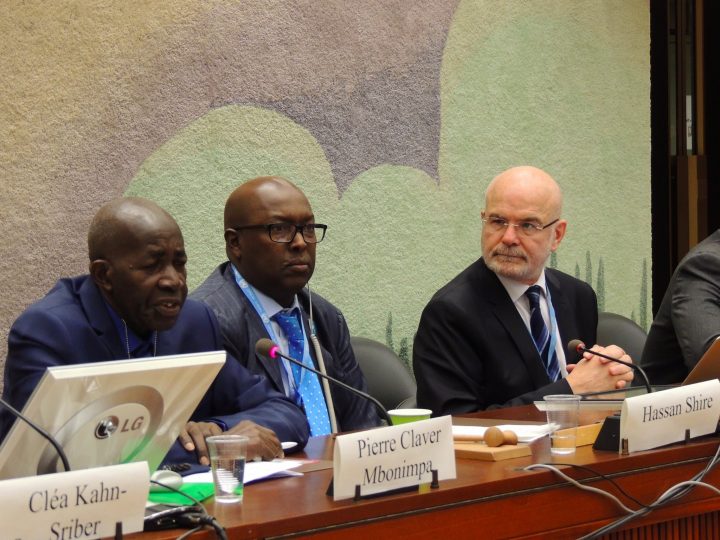KIOS joins campaign calling for the UN to open its doors to NGOs

Renowned Burundian human rights defender Pierre Claver taking part in a side event on Burundi during the UN Human Rights Council session together with Hassan Shire from Defend Defenders and Michel Forst, UN Special Rapporteur on the situation of human rights defenders. Picture by DefendDefenders.
All too often authoritarian states are denying human rights organisations entry to UN debates. KIOS has joined a global campaign that calls for states to take civil society participation seriously when they vote for new members to the UN body that controls NGO accreditations.
349 NGOs around the world have joined the #OpentheDoors2NGOs campaign, coordinated by the International Service for Human Rights (ISHR). The NGOs are calling the states to promote civil society participation at the UN. KIOS has joined the campaign in order to make the voice of human rights defenders heard better at the UN.
At the beginning of the year, Finland began its three-year term in the UN Human Rights Council. Finland is also among the 54 ECOSOC members to vote for 19 new members of the UN NGO Committee in April. The members of this committee are the gatekeepers who decide which NGOs are allowed to operate within the UN and participate in UN debates.
Some of the current members of the committee are working to block human rights organizations by stopping them from getting accredited. At the same time, they prevent the UN from gaining important expertise to help UN bodies promote and protect human rights.
Why is civil society participation at the UN important?
In an ideal world, NGOs would be allowed to participate at the UN and bring their own perspectives to the UN debates. For example, NGOs can submit shadow reports, where they set out their views on the human rights situation and government action in a particular country. NGOs may bring victims of human rights violations before the Human Rights Council or the committees monitoring the UN treaties. They may hold informal side events in to raise important human rights issues for discussion.
Human rights defenders can bring their diverse, alternative and expert views to the UN. They often have an understanding of local human rights issues and access to marginalized groups and victims of human rights abuses, whose voices would otherwise not be heard at the UN.
NGOs have also played an important role in the creation of many international human rights treaties. For example, the Convention on the Rights of Persons with Disabilities was adopted at the UN in 2006 as a result of long-standing advocacy work by disability organizations.
Harassment of human rights organisations
Yet many NGOs are denied access to UN debates, especially those who do critical human rights work. NGOs wishing to make statements or hold side events in connection with meetings of the UN Human Rights Council must apply for accreditation.
This is not easy, as the accreditation of NGOs is overseen by the Committee on NGOs, which is made up of UN member states and has many states that do not like critical votes. As members of the committee, they can block NGOs, for example by asking additional questions, thus prolonging the accreditation process for years.
Currently, 41 organisations have waited for their accreditation for more than four years. Two human rights organisations have faced over ten years of deferrals.
“Open the Doors to the NGOs”
The groups of NGOs wants a Committee on NGOs that actively support civil society participation at the UN. For that to happen, the campaign has three main calls on UN members:
- States with a positive record on promoting civil society to stand as candidates.
- Elections to be competitive
- States to vote with integrity
Read more about the campaign and watch a video where IFEX, one of the over 40 organisations denied access to the UN, talks about the value of civil society participation at the UN.
